Road to Perdition (Sam Mendes) 2002
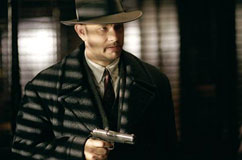 Early on in Sam Mendes’ 1930’s set gangster film Road
to Perdition, one of the bad guys is asked, “Why are you always
smiling?” and he replies, “Because it’s all so fucking hysterical,” with
a small laugh. This is fairly ironic, because there’s next to nothing that’s
hysterical in Mendes’ hyper-controlled world. Everything’s been scripted and
art-directed until all spontaneity ceases to exist, and the end result is a
movie that feels stifling and utterly embarrassed to be a genre picture. The
dominant image here seems to be a figure slowly walking alone down a hallway or
alley – hardly the sort of visual that thrills. Though the movie is
attractive, and pauses to fetishize smoke, sepia, and rainstorms, it also seems
to find it necessary to tart up every action scene with unnecessary and false
artiness in hopes of transcending what he must perceive as a gangster movie
stigma. He fails miserably at his attempted transcendence, and ends up creating
an unentertaining gangster flick at the same time. The set pieces, when they
finally emerge, feel muted to the point where they have little effect at all.
Just because Mendes is disdainful of the genre, doesn't mean that we want to be
alienated from it, but we have no choice. Half of the scenes are shot through doorways as a way of distancing us from the
action, and reminding us of its artificiality, but Mendes provides no commentary
on the action that makes such a distancing device necessary or desirable. It's
impossible to surrender yourself to a movie that keeps alerting you that it's
fake as this does. Since the film is
as straightforward as it is, Road becomes a self-conscious exercise in
style for style’s sake. Its artiness becomes a disruption.
Early on in Sam Mendes’ 1930’s set gangster film Road
to Perdition, one of the bad guys is asked, “Why are you always
smiling?” and he replies, “Because it’s all so fucking hysterical,” with
a small laugh. This is fairly ironic, because there’s next to nothing that’s
hysterical in Mendes’ hyper-controlled world. Everything’s been scripted and
art-directed until all spontaneity ceases to exist, and the end result is a
movie that feels stifling and utterly embarrassed to be a genre picture. The
dominant image here seems to be a figure slowly walking alone down a hallway or
alley – hardly the sort of visual that thrills. Though the movie is
attractive, and pauses to fetishize smoke, sepia, and rainstorms, it also seems
to find it necessary to tart up every action scene with unnecessary and false
artiness in hopes of transcending what he must perceive as a gangster movie
stigma. He fails miserably at his attempted transcendence, and ends up creating
an unentertaining gangster flick at the same time. The set pieces, when they
finally emerge, feel muted to the point where they have little effect at all.
Just because Mendes is disdainful of the genre, doesn't mean that we want to be
alienated from it, but we have no choice. Half of the scenes are shot through doorways as a way of distancing us from the
action, and reminding us of its artificiality, but Mendes provides no commentary
on the action that makes such a distancing device necessary or desirable. It's
impossible to surrender yourself to a movie that keeps alerting you that it's
fake as this does. Since the film is
as straightforward as it is, Road becomes a self-conscious exercise in
style for style’s sake. Its artiness becomes a disruption.
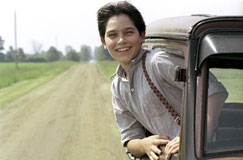 Worse yet, Mendes’ style often doesn’t bring us any
closer to the emotions at the center of this tale. Though the film is told from
the perspective of a naive 12-year-old boy, surprisingly little of the violence
is rendered in any way that feels shocking. Seeing people get shot here is
usually a surprisingly bloodless and hands off affair. It doesn’t even stun us
much when we see Tom Hanks, as Michael Sullivan, pulling the trigger, which
seems to work against the main reasons why casting him in a role like this seem
inspired. Though he plays a hit man, he is filled with the same sort of humility
and morality that has surrounded him for the last few years both on-screen and
off. Early on, when one minor character is eulogizing his brother, he says that,
“He was loyal and brave and he never told a lie.” Mendes cuts here to Hanks,
as if to point out that his character still stands for these values, despite his
slightly darker role here (this is in case we missed him rolling his eyes three
minutes earlier as his kids ran off to gamble with dice), effectively diffusing
any of the actor’s attempts to build on his character as written instead of
his persona. Midway through the film, when a farmer tells Sullivan that his son
“is a good worker” you expect his eyes to well up with tears, because his
son has achieved the same sort of simple and modest virtue that is presented as
beyond reproach here.
Worse yet, Mendes’ style often doesn’t bring us any
closer to the emotions at the center of this tale. Though the film is told from
the perspective of a naive 12-year-old boy, surprisingly little of the violence
is rendered in any way that feels shocking. Seeing people get shot here is
usually a surprisingly bloodless and hands off affair. It doesn’t even stun us
much when we see Tom Hanks, as Michael Sullivan, pulling the trigger, which
seems to work against the main reasons why casting him in a role like this seem
inspired. Though he plays a hit man, he is filled with the same sort of humility
and morality that has surrounded him for the last few years both on-screen and
off. Early on, when one minor character is eulogizing his brother, he says that,
“He was loyal and brave and he never told a lie.” Mendes cuts here to Hanks,
as if to point out that his character still stands for these values, despite his
slightly darker role here (this is in case we missed him rolling his eyes three
minutes earlier as his kids ran off to gamble with dice), effectively diffusing
any of the actor’s attempts to build on his character as written instead of
his persona. Midway through the film, when a farmer tells Sullivan that his son
“is a good worker” you expect his eyes to well up with tears, because his
son has achieved the same sort of simple and modest virtue that is presented as
beyond reproach here.
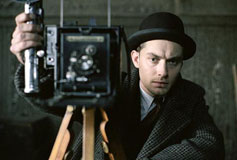 The supporting cast isn’t used much more adeptly.
Jennifer Jason Leigh’s role is little more than a cameo. Paul Newman shows
some impressive strength early on, but unfortunately resorts to speaking in
hushed tones when he wants to stress his moral dilemmas, and as a result renders
his character impotent. Jude Law plays a rival hit man who photographs his
victims, and then sells the pictures to newspapers. His character, whose
motivation is the feeling of life that his proximity to death makes him feel, is
clichéd, but it’s also one of the few truly pulpy touches in the movie.
It’s unfortunate, then, that his character seems also the have been conceived
as an extended homage to Alex from Kubrick’s A Clockwork Orange –
complete with bowler hat and blackened eye – since it keeps him from having
any real impact as a villain here. Instead of being afraid of his character,
we’re amused by the reference.
The supporting cast isn’t used much more adeptly.
Jennifer Jason Leigh’s role is little more than a cameo. Paul Newman shows
some impressive strength early on, but unfortunately resorts to speaking in
hushed tones when he wants to stress his moral dilemmas, and as a result renders
his character impotent. Jude Law plays a rival hit man who photographs his
victims, and then sells the pictures to newspapers. His character, whose
motivation is the feeling of life that his proximity to death makes him feel, is
clichéd, but it’s also one of the few truly pulpy touches in the movie.
It’s unfortunate, then, that his character seems also the have been conceived
as an extended homage to Alex from Kubrick’s A Clockwork Orange –
complete with bowler hat and blackened eye – since it keeps him from having
any real impact as a villain here. Instead of being afraid of his character,
we’re amused by the reference.
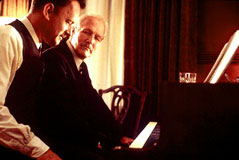 It’s tough, though, to use a cast effectively, when the
source material is as mediocre as it is in Road to Perdition. Hackneyed
religious symbolism is abundant here, and most of it feels embarrassing, since
Mendes doesn’t find an effective way of making us feel that it’s tied into
the lives of these generally immoral Irish Americans in a significant way. We
see them praying before dinner, and going to church, and a funeral, but it all
feels like window dressing. When Michael and his son drive past a crossroads, it
looks like a literal cross, pointing their way toward absolution, but the
message of the movie seems to suggest that their path toward salvation is won
through fighting instead of faith. As such it seems as if Mendes is vastly
overplaying his hand when he has the boy adopt a statue of the Virgin Mary or
has him write “I will not fight with other boys,” on a blackboard while a
nun watches. The other symbolic touches, such as when Hanks and Newman play a
song from a tattered songbook of “Irish Songs” or when the boys play dead
after a brief snowball fight, are equally ham fisted.
It’s tough, though, to use a cast effectively, when the
source material is as mediocre as it is in Road to Perdition. Hackneyed
religious symbolism is abundant here, and most of it feels embarrassing, since
Mendes doesn’t find an effective way of making us feel that it’s tied into
the lives of these generally immoral Irish Americans in a significant way. We
see them praying before dinner, and going to church, and a funeral, but it all
feels like window dressing. When Michael and his son drive past a crossroads, it
looks like a literal cross, pointing their way toward absolution, but the
message of the movie seems to suggest that their path toward salvation is won
through fighting instead of faith. As such it seems as if Mendes is vastly
overplaying his hand when he has the boy adopt a statue of the Virgin Mary or
has him write “I will not fight with other boys,” on a blackboard while a
nun watches. The other symbolic touches, such as when Hanks and Newman play a
song from a tattered songbook of “Irish Songs” or when the boys play dead
after a brief snowball fight, are equally ham fisted.
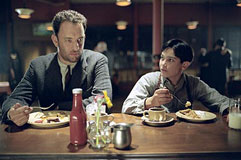 Whatever Mendes does to the film here, there’s no denying
that it has some decent production values. It’s a shame then that they seem
wildly uncontrolled. The score, for example, which recalls an Irish-themed
variation on the American Beauty score, is so omnipresent that it feels
like the actual star of the picture. When it finally fades into the background,
as it does for a calm father/son chat between Michael Sr. and Michael Jr., while
they recuperate on a secluded farm (Is there a chain of these things? They crop
up in movies so often that you’d think so.) after a gunfight, the effect is so
noticeable that Mendes might as well flash the words “Quiet Moment” on the
bottom of the screen. Instead he puts chirping crickets on the soundtrack to
enhance the silence… then he has the music swell back in louder than before,
when the scene climaxes. The rest of the film operates similarly, using artistry
to force on the audience sentiment that feels outmoded, but obviously isn’t
since it inspires a positive popular reaction. It’s no wonder that this was
seen as a perfect vehicle for Hanks.
Whatever Mendes does to the film here, there’s no denying
that it has some decent production values. It’s a shame then that they seem
wildly uncontrolled. The score, for example, which recalls an Irish-themed
variation on the American Beauty score, is so omnipresent that it feels
like the actual star of the picture. When it finally fades into the background,
as it does for a calm father/son chat between Michael Sr. and Michael Jr., while
they recuperate on a secluded farm (Is there a chain of these things? They crop
up in movies so often that you’d think so.) after a gunfight, the effect is so
noticeable that Mendes might as well flash the words “Quiet Moment” on the
bottom of the screen. Instead he puts chirping crickets on the soundtrack to
enhance the silence… then he has the music swell back in louder than before,
when the scene climaxes. The rest of the film operates similarly, using artistry
to force on the audience sentiment that feels outmoded, but obviously isn’t
since it inspires a positive popular reaction. It’s no wonder that this was
seen as a perfect vehicle for Hanks.
* *
07-14-02
Jeremy Heilman